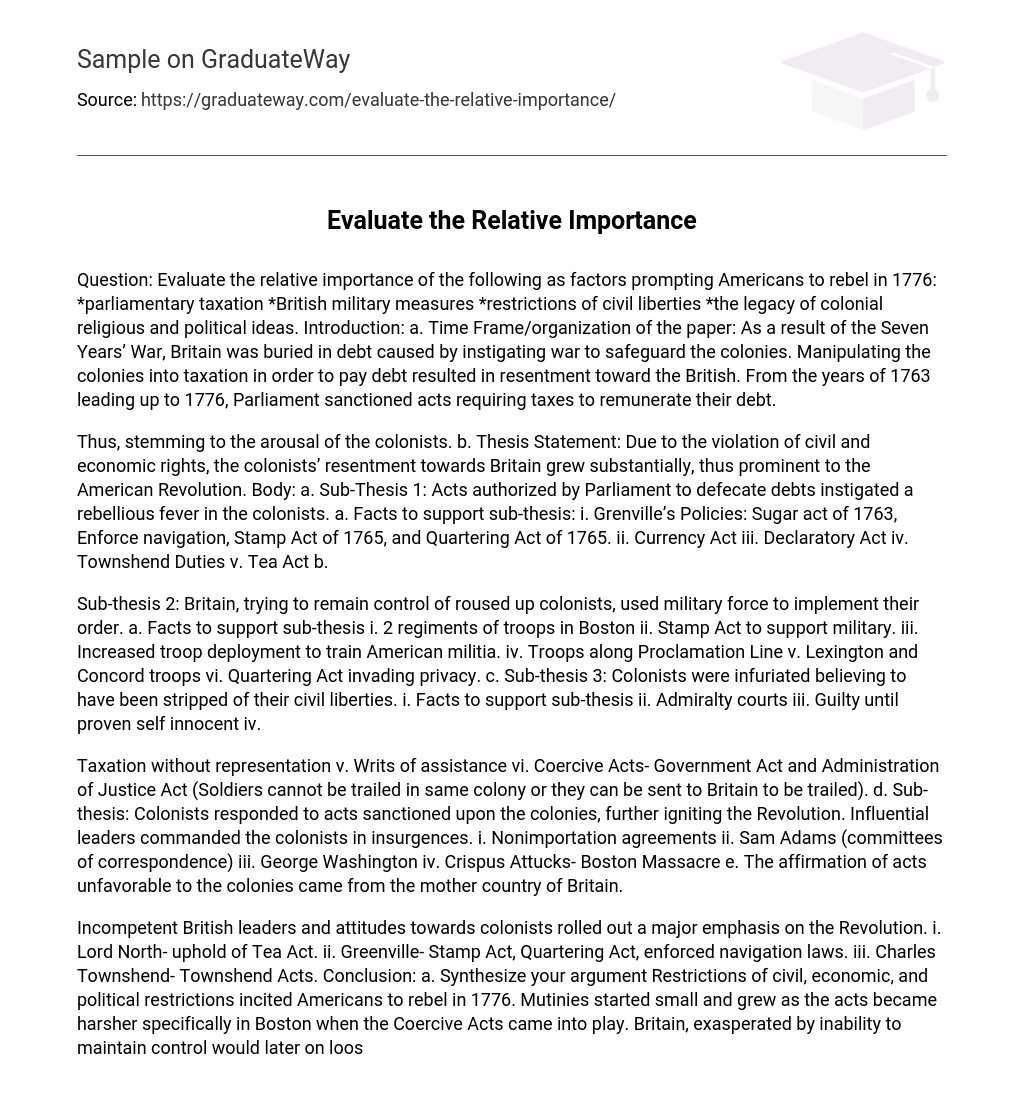Question: Evaluate the relative importance of the following as factors prompting Americans to rebel in 1776: *parliamentary taxation *British military measures *restrictions of civil liberties *the legacy of colonial religious and political ideas. Introduction: a. Time Frame/organization of the paper: As a result of the Seven Years’ War, Britain was buried in debt caused by instigating war to safeguard the colonies. Manipulating the colonies into taxation in order to pay debt resulted in resentment toward the British. From the years of 1763 leading up to 1776, Parliament sanctioned acts requiring taxes to remunerate their debt.
Thus, stemming to the arousal of the colonists. b. Thesis Statement: Due to the violation of civil and economic rights, the colonists’ resentment towards Britain grew substantially, thus prominent to the American Revolution. Body: a. Sub-Thesis 1: Acts authorized by Parliament to defecate debts instigated a rebellious fever in the colonists. a. Facts to support sub-thesis: i. Grenville’s Policies: Sugar act of 1763, Enforce navigation, Stamp Act of 1765, and Quartering Act of 1765. ii. Currency Act iii. Declaratory Act iv. Townshend Duties v. Tea Act b.
Sub-thesis 2: Britain, trying to remain control of roused up colonists, used military force to implement their order. a. Facts to support sub-thesis i. 2 regiments of troops in Boston ii. Stamp Act to support military. iii. Increased troop deployment to train American militia. iv. Troops along Proclamation Line v. Lexington and Concord troops vi. Quartering Act invading privacy. c. Sub-thesis 3: Colonists were infuriated believing to have been stripped of their civil liberties. i. Facts to support sub-thesis ii. Admiralty courts iii. Guilty until proven self innocent iv.
Taxation without representation v. Writs of assistance vi. Coercive Acts- Government Act and Administration of Justice Act (Soldiers cannot be trailed in same colony or they can be sent to Britain to be trailed). d. Sub-thesis: Colonists responded to acts sanctioned upon the colonies, further igniting the Revolution. Influential leaders commanded the colonists in insurgences. i. Nonimportation agreements ii. Sam Adams (committees of correspondence) iii. George Washington iv. Crispus Attucks- Boston Massacre e. The affirmation of acts unfavorable to the colonies came from the mother country of Britain.
Incompetent British leaders and attitudes towards colonists rolled out a major emphasis on the Revolution. i. Lord North- uphold of Tea Act. ii. Greenville- Stamp Act, Quartering Act, enforced navigation laws. iii. Charles Townshend- Townshend Acts. Conclusion: a. Synthesize your argument Restrictions of civil, economic, and political restrictions incited Americans to rebel in 1776. Mutinies started small and grew as the acts became harsher specifically in Boston when the Coercive Acts came into play. Britain, exasperated by inability to maintain control would later on loose the colonies to what becomes the United States of America.





